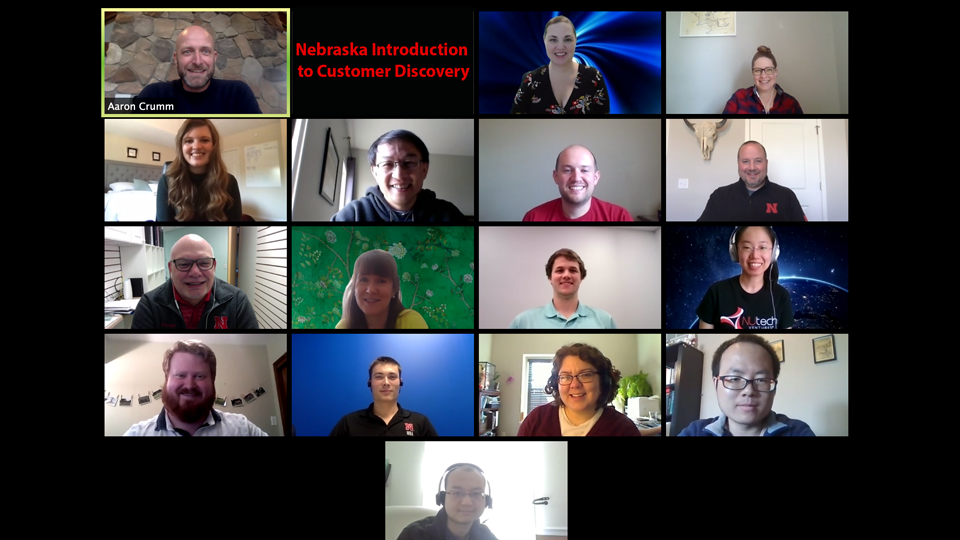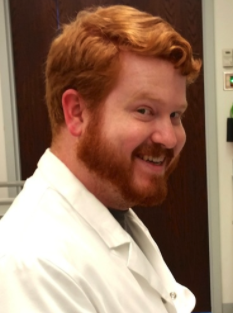
A program at the University of Nebraska–Lincoln is encouraging researchers to step outside the lab and view their innovation from stakeholders’ perspectives.
The program, Nebraska Introduction to Customer Discovery, launched its second cohort this spring, via Zoom, with 11 teams representing departments across campus. It is modeled after the National Science Foundation’s Innovation Corps, in which researchers interview stakeholders to understand their needs — and then use that feedback to guide decisions about a startup company or technology commercialization.
The program included weekly office hours with staff from NUtech Ventures, Nebraska’s Center for Entrepreneurship, Invest Nebraska and the National Strategic Research Institute at the University of Nebraska. It also featured sessions to learn concepts such as value proposition and customer segmentation, which helps entrepreneurs narrow their focus to test specific hypotheses.

The free, non-credit program will be offered again in the fall semester and is open to university faculty, staff and students. To receive more information, email info@nutechventures.org.
To better understand the benefits of the program, NUtech Ventures sat down with Sean Carr, a doctoral student of biological sciences who completed the spring 2020 program. His team, Molecular Trait Evolution, includes Nicole Baun, associate professor of biochemistry, and Paul Blum, Charles Bessey Professor of biological sciences.
Can you discuss your project and your team’s objectives for the program?
Molecular Trait Evolution is a team of researchers who specialize in using “extreme” biological traits for real-life applications. We developed an enzyme cocktail which could help bioethanol facilities produce more ethanol from plants. During (Introduction to Customer Discovery), our team wanted to see if existing ethanol manufacturers would be interested in using our enzyme cocktail to try different feedstocks for ethanol production, instead of just corn.
How did your project evolve while going through the process?
We thought we were going to provide more feedstock options for ethanol plants. Instead of using corn, we thought they could use wheatgrass or stover, leftover plant material after corncobs have been harvested. It turns out we were barking up the wrong tree. The vast majority of corn ethanol facilities are specialized to produce ethanol exclusively from corn and it isn’t economically feasible for most of them to switch feedstocks.
However, we learned that we could explore how our technology could help them squeeze more ethanol out of the material they were already using. More than that, we learned how the industry works from the inside — directly from those who work in it. Our team found issues we could address that we didn’t even know were problems.
What were some of your biggest takeaways from the program?
I learned that you can’t just assume what people are going to want. Before going down the rabbit hole and investing significant time, energy, and cash into your product, it is critical to make sure there is a critical need for the product.
It’s also important to talk to the people your product is going to be affecting and not just the end-user. At the end of the day, it isn’t only the end-user you will have to interact with, there will be others involved with scaling-up or mass producing your product. Some of the best feedback I got during customer discovery came from people on the ‘outskirts’ of the industry where our technology would be implemented. Talking to plant managers, technical experts, and CEOs of ethanol plants was immensely useful but so was reaching out to corn growers, beef ranchers, and federal representatives. These conversations gave me a greater idea of the business ecosystem and where we fit within it.
Would you recommend the program to others?
I would definitely recommend the N-ICD course to others. It really helped me learn how to speak the language of entrepreneurship. It’s a cliché to say that scientists don’t have good communication skills (some of the best orators I know are scientists), but we are conditioned for a certain type of vocabulary and presentation style. This course helped me make our innovations more approachable and provided an excellent primer for the next phase of growing our startup. Most importantly, however, I was able to develop a network of contacts here at UNL, as well as in the wider ethanol industry.







